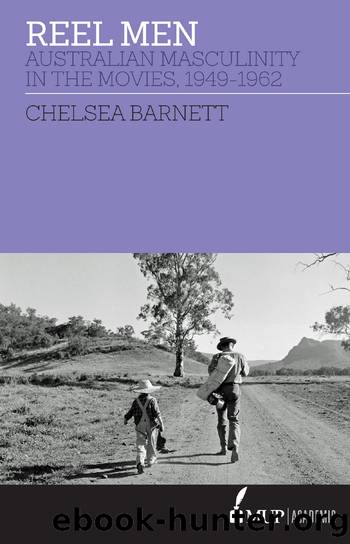Reel Men: Australian Masculinity in the Movies 1949-1962 by Chelsea Barnett

Author:Chelsea Barnett [Barnett, Chelsea]
Language: eng
Format: epub
Tags: history, Australia & New Zealand, Performing Arts, Film, General
ISBN: 9780522872484
Google: LH-JDwAAQBAJ
Publisher: Melbourne University Publishing
Published: 2019-02-19T00:18:46.442523+00:00
These establishing shots of the entire King family, as well as the narrationâs reference to families, fathers and sons, are important in representing and legitimating the white model of pioneer masculinity.
Much like the model of masculinity celebrated by radical nationalists, the pioneer understanding of masculinity emerged in the 1890s and was located in the Australian bush. The filmâs opening narration and scenes establish the importance of the rural landscape, and foreshadow Wallyâs struggles with climate, environment, food and foeâaccording to Ann Curthoys, the pioneerâs obstacles are âmainly the land itselfâ.32 The two models of masculinity also shared a working-class sensibility, affirmed by Chips Raffertyâs casting as Wally. Raffertyâs part in Bitter Springs continued his âubiquitousâ roles as working-class men in Australian films of the fifties; The Australian Womenâs Weekly commented that Wally was a role âtailor-madeâ for the actor.33 But the radical nationalist and pioneer models of masculinity were ultimately distinct. Unlike radical nationalist masculinity, which maligned family commitments and responsibilities, women and the family were important to the pioneer legend. It was this very inclusiveness that explained its popularity: it â[crossed] serious social divides of class and gender, celebrating small and large farmers and men and women alikeâ.34 But while radical nationalism enjoyed cultural proliferation through contemporary historical texts, the pioneer masculinity with which Bitter Springs engaged did not benefit from any such intellectual celebration. What, then, was driving Bitter Springsâ representation of this masculine type?
John Hirstâs work on the pioneer legend (which encapsulated pioneer masculinity) highlighted continuity as one of its key elements. The ongoing legitimacy of the legend caught subsequent generations in a âspecial obligation not to tamper with the world the pioneers madeâ.35 Yet in the fifties, and the broader postwar context of decolonisation, increasing nationalist bids meant that the very opposite was unfolding. Decolonisation not only sat against the pioneer legendâs emphasis on continuity, but also forgot the hardships of white peopleâanother of its important components. Bitter Springsâ representation of pioneer masculinity functioned as a cultural response to the postwar trend of decolonisation. That this response was offered through a film about Indigenous Australians was fitting; WG Sanders, scholar of Indigenous affairs, argues that Indigenous Australians âwere the most thoroughly colonised of all peoplesâ.36 The legitimation of pioneer masculinity in this film both functioned to advocate for the ongoing colonisation in Australiaâfinally putting to rest the Aboriginal âproblemââand aligned with Australian opposition to decolonisation more generally. Certainly, colonialism located Indigenous people as occupying a position that threatened the national interest. In seeking to eliminate this danger, Bitter Springs legitimated white pioneer masculinity and, by extension, white colonisation, thus legitimating the exclusion of Indigenous people from the white national ideal.
Bitter Springsâ efforts to exclude Indigeneity are established in the filmâs opening scenes. Wally and his family stop at a small town to hire some men. Although Wally promises them three monthsâ work, the men fear encountering the unknown: âAbos. Wild blacks. Hundreds of âem!â Eventually hiring Scottish carpenter Mac, English vaudevillian-turned-stockman Tommy, and Tommyâs small son Charlie, the group continues their trek.
Download
This site does not store any files on its server. We only index and link to content provided by other sites. Please contact the content providers to delete copyright contents if any and email us, we'll remove relevant links or contents immediately.
Kathy Andrews Collection by Kathy Andrews(11807)
The remains of the day by Kazuo Ishiguro(8965)
Paper Towns by Green John(5174)
Spare by Prince Harry The Duke of Sussex(5173)
The Body: A Guide for Occupants by Bill Bryson(5075)
Industrial Automation from Scratch: A hands-on guide to using sensors, actuators, PLCs, HMIs, and SCADA to automate industrial processes by Olushola Akande(5044)
Machine Learning at Scale with H2O by Gregory Keys | David Whiting(4289)
Be in a Treehouse by Pete Nelson(4031)
Never by Ken Follett(3930)
Harry Potter and the Goblet Of Fire by J.K. Rowling(3842)
Goodbye Paradise(3795)
The Remains of the Day by Kazuo Ishiguro(3388)
Into Thin Air by Jon Krakauer(3383)
Fairy Tale by Stephen King(3366)
The Cellar by Natasha Preston(3332)
The Genius of Japanese Carpentry by Azby Brown(3282)
120 Days of Sodom by Marquis de Sade(3256)
Reminders of Him: A Novel by Colleen Hoover(3072)
Drawing Shortcuts: Developing Quick Drawing Skills Using Today's Technology by Leggitt Jim(3069)
